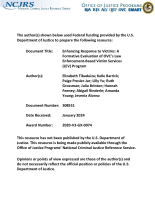Police chiefs
Strain of Change: Voices of Los Angeles Police Officers
Reimplementation of Differential Police Response
Batteries for Personal/Portable Transceivers
Evaluation of the Differential Police Response Field Test, Research Report
Responding to Intimate Partner Violence Related Strangulation Integrating Policy, Practice, and Rese
This webinar examines the problem of Intimate Partner Violence Strangulation and an innovative response policy. The presentation will include an overview of the nature and extent of strangulation, its dangers, and adverse medical consequences followed by a review of a Strangulation Ordinance in Burleson, Texas that mandates extensive training for first responders and a city-wide response protocol for strangulation detection and investigation, documentation of strangulation signs and symptoms, medical assistance, and service referrals for strangulation survivors.
See the YouTube Terms of Service and Google Privacy Policy
Celebrating 10 Years of NIJ’s Law Enforcement Advancing Data and Science (LEADS) Scholars Program - 2024 NIJ Research Conference
In 2014, NIJ established the Law Enforcement Advancing Data and Science (LEADS) Scholars Program to support research-minded, mid-career sworn law enforcement officers working to integrate research into agency policy and practice. The LEADS Scholars Program helps participants develop independent research and provides support to identify current evidence on priority issues.
See the YouTube Terms of Service and Google Privacy Policy
Enhancing Response to Victims: A Formative Evaluation of OVC's Law Enforcement-Based Victim Services (LEV) Program
What's Known and Unknown about Marijuana, Part 2
Marijuana legalization poses many challenges — especially those related to drug chemistry and toxicology — for researchers, law enforcement, and policy makers. In the latest episode of Justice Today, NIJ Communications Assistant Josh Mondoro hosts a conversation with NIJ Scientist Frances Scott about marijuana toxicology, including comparing its effects to alcohol, measuring impairment, and maintaining public safety as more and more states legalize recreational marijuana.
What's Known and Unknown about Marijuana, Part 1
Marijuana poses many challenges for researchers, law enforcement, and policy makers, challenges that fall into two fields: drug chemistry and toxicology. NIJ scientist Dr. Frances Scott joins this episode to explain the complications in drug chemistry and how difficulties defining marijuana lead to backlogs in crime labs around the country. NIJ Communications Assistant Josh Mondoro hosts.
Webinar: NIJ Research Assistantship Program Informational Webinar
This recorded webinar, originally held September 28, 2023, provides information on NIJ’s Research Assistantship Program, which offers highly qualified doctoral students the opportunity to bring their expertise to NIJ to work across offices and program areas to obtain a practical and applied research experience. The program is a research focused professional development opportunity for doctoral students from all academic disciplines. NIJ...
Policing Leadership and Accountability: Harnessing Big Data and Causal Inference for Evaluating Police Reform Practices
We Met Them Where They Are, But Is It Enough? A Qualitative Examination Of A Co-Response Outreach Program Servicing Vulnerable Populations in Philadelphia
De-escalation Training: What Works, Implementation Lessons, and Taking It to Scale; Plenary at the 2023 NIJ Research Conference
Police use of force, while infrequently used, is a tremendous concern to public safety in the United States when officers employ it excessively or inappropriately, causing injury or death and eroding public trust in law enforcement. This plenary from the 2023 NIJ Research Conference describes the Integrating, Communications, Assessment, and Tactics (ICAT) de-escalation training program developed by the Police Executive Research Forum to guide officers in defusing critical incidents.
See the YouTube Terms of Service and Google Privacy Policy
Progressing from Evidence to Action
Police Use Science and Community Partnerships to Reduce Gun Violence
In an NIJ podcast, LEADS Scholars from three police departments discuss how they worked with community organizations and used evidence-based policing to reduce gun violence
Driving Down Gun Violence, Part 2
Three LEADS Scholars serving in different law enforcement agencies and positions discuss their experiences with identifying and implementing evidence-based interventions to reduce gun violence. NIJ Senior Advisor Dr. Tamara Herold hosts this conversation with guests Police Chief Cecilia Ashe (Milford Delaware Police Department), Chief of Staff Lieutenant Matthew Barter (Manchester, NH Police Department), and Analytical Services Manager Mr. Jason Schiess (Durham, NC Police Department).
Driving Down Gun Violence
Driving Down Gun Violence, Part 1
Three LEADS Scholars serving in different law enforcement agencies and positions discuss their experiences with identifying and implementing evidence-based interventions to reduce gun violence. NIJ Senior Advisor Dr. Tamara Herold hosts this conversation with guests Police Chief Cecilia Ashe (Milford Delaware Police Department), Chief of Staff Lieutenant Matthew Barter (Manchester, NH Police Department), and Analytical Services Manager Mr. Jason Schiess (Durham, NC Police Department).
Examining Intersections between Law Enforcement and Victims
Campus Sexual Assault Responses (CSAR): Informing Trauma-Informed Policies, Protocols, and Training
Sexual violence is a significant criminal justice problem with long-term effects for its victims. In particular, sexual assault on or related to college campuses across the United States presents a growing public health and economic burden, starting with significant impacts on academic outcomes.
See the YouTube Terms of Service and Google Privacy Policy





